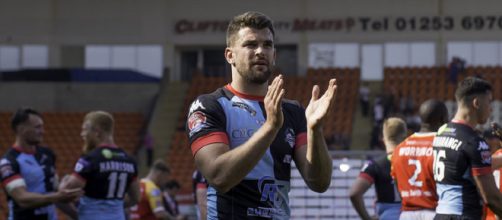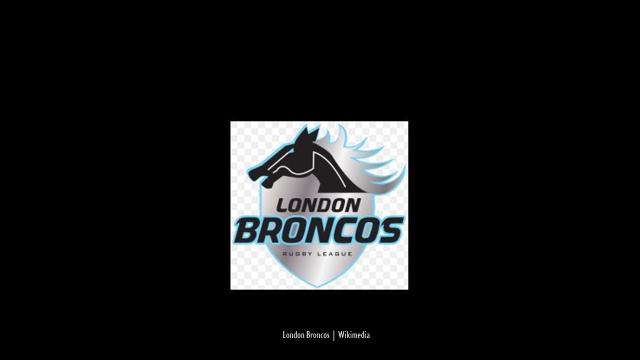London Broncos have had a fantastic season in the Championship, finishing second behind runaway leaders Toronto. The capital side have taken that form into the Qualifiers so far, beating Widnes on their own patch, 20-21. Yet, it's been a torrid decade for the Broncos; having been renamed once again after the Harlequins RL project failed in 2012, the club began a steep decline on and off the field.
On the brink of administration by the end of 2013, the London club was relegated from Super League in 2014 with just one win from 27 games. Since then, from almost the depths of insolvency, the Broncos have rebuilt - with the constant support of chairman David Hughes - to be within a shot of finally becoming a top-flight side once more.
A struggling club
In 2007, Brian McDermott, who became the most successful head coach in the history of Super League at Leeds Rhinos later on in his career, took over at the newly-revamped Harlequins RL after head coach Tony Rea took the club - previously named London Broncos too - to 7th in 2006. McDermott, however, presided over a steady decline of the side; Harlequins finished 9th in 2007 and 2008, then 11th in 2009 and a lowly 13th in 2010 - saved from bottom place by French outfit Catalans Dragons.
Ahead of the 2011 season, McDermott was replaced by Rob Powell who won his first three games in charge; a new positive era appeared to beckon until a club record 82-6 thrashing by Warrington in March 2011 soon brought the Harlequins faithful back down to earth.
That season, Harlequins finished 12th. At the end of 2011, the club once more reverted to their old London Broncos tag, unveiling a new logo as well as new colours of black, light blue and silver. Again, things seemed rosy from the off with the Broncos winning their first competitive match post-name change against St Helens, 34–24. Even more positive was the fact that this fixture was played in front of a 4,924 crowd, which was higher than all of their attendances in the year before.
Yet, once again, the positivity soon waned, with the club finishing 12th. Rea took over the reins yet again from Rob Powell for 2013, but another 12th placed finish cut short any sort of optimism that had been brewing at the beginning of the year despite the fact that the Broncos reached the Challenge Cup semi-final.
Unfortunately for London, financial problems were made evident when, on 20 November 2013, the club announced that it would have to enter administration in ten working days if a new owner was not found. It was left to David Hughes - who acquired shares in the club from Virgin in 2002 - to carry on putting his hard-earned millions into the capital side in order to save it.
Relegation and rebuilding
With the onset of financial difficulty, London lost 21 players from its first-team squad going into the 2014 season. Winning one game all year, the Broncos' relegation was confirmed midway through July. Tony Rea had quit early on in the year following an 11-game losing run with assistant Joey Grima taking over, but the change in personnel did little to inspire an upturn in form.
2015 would be the first of all 19 Super League seasons to not feature a London side, but no one could say that the relegation hadn't been on the cards. Young stars such as Denny Solomona and Mike McMeeken left the club, but who could blame them? London was a side that was going nowhere but backwards - and fast.
It was left to those that had never been keen on the idea of an expansionist London club to poke fun and remark that this "was the end of Rugby League in the capital". But, the club has defied the odds, slowly strengthening their youth system, moving to a smaller capacity ground at Ealing - the Broncos had previously played at the Stoop and the Hive Stadium - and building a team and organisation based on unity and hard work.
They have gone about their business quietly, qualifying for three out of four Qualifiers, finishing sixth in 2016 and 2017, after narrowly missing out in 2015 - Grima resigned midway through 2015 to be replaced by Andrew Henderson - and look well-placed to cause Super League sides a number of issues in the 2018 Qualifiers.
Danny Ward, ex-London and Leeds star, took over at the end of 2017 as Henderson departed for Warrington as assistant coach. Many - including Rugby League legend Garry Schofield, who predicted London to finish well outside the Championship top four - believed the Broncos would flop following Henderson's departure.
Ward, however, has inspired the Broncos to another fantastic season in 2018; with only Toronto ahead of them, London finished second for the third consecutive season.
And, whilst in previous seasons the Qualifiers have seemingly been a step too far, the Broncos appear perfectly placed to be one of the dark horses in this year's promotion battle.
Victory at Widnes
When the Qualifiers' fixtures came out, both Widnes and London will have pinpointed their opening clash as a must-win game. Widnes, on a run of 16 successive defeats, looked edgy even though they were winning 6-0 at half-time. The Broncos, meanwhile, looked rejuvenated in the second half and took the game to the Vikings, running out 20-21 winners.
What this game said most of all was that, yes, Widnes are a side definitely heading on a downward spiral, but it also made clear that London is a side most definitely on the up.
It's taken London - and owner David Hughes - nearly five years to climb their way back up to a position of strength.
Not only are Toronto and Toulouse very dangerous sides, Leeds, Hull KR, Salford and Widnes - the latter as we've already seen - need to be extremely wary of London. With Jarrod Sammut and Api Pewhairangi pulling the strings behind a ferocious pack boasting the likes of Eddie Battye and Tom Spencer, the Broncos have a superbly-balanced squad, capable of finally righting the wrongs of 2014.
For those Widnes fans nearing the end of their tether, relegation does not signal the end for your club; in fact, it may - as London are currently showing - be the best in the long run.




